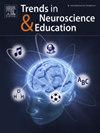幼儿教育工作者对神经科学的运用:知识、态度、自我效能感与专业学习
IF 3.4
Q2 NEUROSCIENCES
引用次数: 0
摘要
早期大脑发育的知识在幼儿教育中越来越重要,但目前还没有研究只关注幼儿教育者的神经科学知识和态度。方法对524名澳大利亚幼儿教育工作者进行神经科学知识、态度、自我效能感、知识来源、培训需求等方面的调查。结果虽然教育工作者有相关的认识,但普遍存在“神经神话”。无论他们的社会人口背景如何,参与者都对神经科学持强烈的积极态度。拥有学士或更高学位的参与者,以及那些处于领导地位的参与者,有更高的神经素养和自我效能感。不到四分之一的人表示在他们的职前培训中接受了足够的神经科学内容。结论虽然在幼儿教育中应用神经科学有政策要求和积极的态度,但目前该部门受到有限的职前培训内容和在职专业学习不足的阻碍。需要进一步的跨学科工作来解决这些差距。本文章由计算机程序翻译,如有差异,请以英文原文为准。
Early childhood educators’ use of neuroscience: Knowledge, attitudes, self-efficacy and professional learning
Background
Knowledge of early brain development is increasingly important in early childhood education, but no studies have focussed solely on the neuroscience knowledge and attitudes of early childhood educators.
Methods
524 Australian early childhood educators completed a survey measuring their neuroscience knowledge, attitudes, and self-efficacy, sources of knowledge, and perspectives on training needs.
Results
Although educators held relevant understandings, there was widespread belief in ‘neuromyths’. Participants held strong positive attitudes toward neuroscience regardless of their socio-demographic background. Participants who held a Bachelor degree or higher, and those in a leadership position, had higher neuro-literacy and self-efficacy. Less than a quarter reported receiving adequate neuroscience content in their pre-service training.
Conclusion
While there is a policy mandate and positive attitudes toward using neuroscience in early childhood education, the sector is currently hampered by limited pre-service training content, and inadequate in-service professional learning. Further transdisciplinary work is required to address these gaps.
求助全文
通过发布文献求助,成功后即可免费获取论文全文。
去求助
来源期刊

Trends in Neuroscience and Education
NEUROSCIENCES-
CiteScore
6.30
自引率
6.10%
发文量
22
审稿时长
65 days
 求助内容:
求助内容: 应助结果提醒方式:
应助结果提醒方式:


